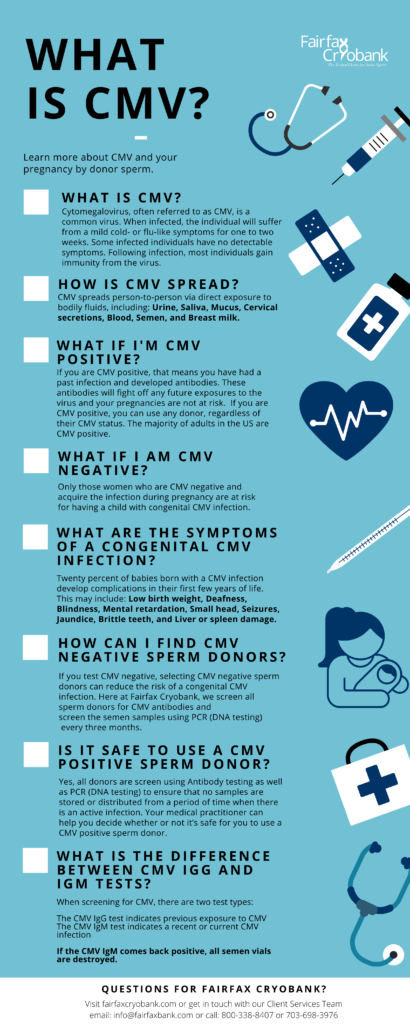What is Cytomegalovirus (CMV) and Why Does it Matter in Pregnancy?
Learn more about CMV and how it relates to your pregnancy, with guest blogger, Christina Barnes

What is cytomegalovirus (CMV)?
Cytomegalovirus (CMV) is a virus that can cause mild illness in some adults. About 90% of adults who contract CMV will not have any symptoms, and they may never know that they had the disease. Those who do have symptoms may have a fever, runny nose, sore throat, headache, or fatigue. Overall, this is not a particularly noteworthy or dramatic illness for otherwise healthy adults. If this virus is so mild, then, why does it matter in pregnancy?
Cytomegalovirus (CMV) in Newborns
Congenital CMV, or CMV acquired by the fetus during pregnancy, can be devastating for babies. If a woman develops a CMV infection during conception or pregnancy, the fetus can become infected and may be symptomatic at birth. Only about 10 to 15 percent of infected newborns will be symptomatic. Symptoms of congenital CMV in newborns include:
- Sensorineural hearing loss
- Visual impairment
- Motor impairment
- Cognitive impairment
- Small for gestational age
- Small head (microcephaly)
- Enlarged ventricles in the brain (ventriculomegaly)
- Inflammation of the eye (chorioretinitis)
- Jaundice
- Enlarged liver and spleen (hepatosplenomegaly)
- Abnormally low levels of platelets in the blood (thrombocytopenia)
Many of these symptoms are permanent and will affect the baby for the rest of his or her life. This is why healthcare providers care about CMV infection during pregnancy, and why they want to prevent a first-time infection in pregnant women who have never been exposed to CMV.
How is Cytomegalovirus (CMV) spread?
CMV is found in different body fluids, including urine, saliva, blood, mucus, tears, cervical and vaginal secretions, semen, and breast milk. CMV can be spread through sexual exposure and close nonsexual contact.
During pregnancy, an active CMV infection is spread from the mother to the fetus through the placenta. During birth, the newborn can become infected with CMV through contact with the mother’s cervix and vagina. After birth, the mother can pass CMV to her newborn through breast milk. Fortunately, CMV infection acquired during or after birth is unlikely to cause severe symptoms in healthy full-term babies. The benefits of breastmilk generally outweigh the risks of CMV infection. Infants whose mothers develop a CMV infection during conception or pregnancy are at the highest risk for having the severe symptoms listed above.
Cytomegalovirus (CMV) in Pregnancy
There are two types of CMV infection in pregnancy: primary and nonprimary.
Primary CMV: This occurs when the first time a woman contracts CMV is during pregnancy. This is her “primary” or initial infection. Prior to this infection, she did not have antibodies for CMV. In other words, she was CMV negative before pregnancy and is now CMV positive.
Secondary CMV: After an individual contracts CMV (pregnant or not pregnant), the virus stays in the system but becomes latent or hidden. This latent virus does not cause symptoms, but it can cause illness and symptoms if it reactivates (think viruses like herpes). A secondary CMV infection during pregnancy occurs when a woman who had CMV before pregnancy has a reactivation of the virus during pregnancy. Unfortunately, scientists do not know how often women have reactivations of CMV during pregnancy, but they do believe that the risk of fetal infection is low.
Frequency of Transmission in Pregnancy
Not every pregnant woman who becomes infected with CMV will transmit the virus to her fetus. The rates of transmission from mother to fetus vary depending on when during pregnancy the infection occurs. The risk for transmitting CMV increases as the pregnancy progresses. So, a woman who contracts CMV in her first trimester is less likely to pass it on to her fetus than a woman who contracts CMV in her third trimester.
A 2013 medical study in Prenatal Diagnosis found the following rates of transmission of CMV from mother to fetus by trimester:
First Trimester: 36.5 %
Second Trimester: 40.1 %
Third Trimester: 65 %
Even though rates of transmission from mother to fetus are lower during early pregnancy, the risk for severe disease in the newborn is higher when CMV is contracted in the first trimester.
I am CMV positive (+) before pregnancy. What does this mean for me and my future baby?
If you are CMV positive (+) before pregnancy, this means that you have already been exposed to CMV and have the antibodies in your system. You are not at risk of developing a primary infection during pregnancy. You can have a child with a CMV positive or negative partner or donor, and this will not affect your CMV status.
I am CMV negative (-) before pregnancy. What does this mean for me and my future baby?
If you are CMV negative (-) before pregnancy, this means that you have not had a primary infection and do not have CMV antibodies. If you do not become actively infected with CMV before pregnancy, you will continue to be negative as you start your pregnancy. It is important to avoid others with known active CMV infections during your pregnancy. You also want to make sure that if using a sperm donor to conceive, you select a donor who is CMV negative. This way, you won’t develop a primary CMV infection from the donor sperm.
For information about Cytomegalovirus (CMV) and how it could impact your pregnancy by donor sperm, view our CMV infographic below or visit our CMV and Pregnancy resource page.









What is Cytomegalovirus (CMV) and Why Does it Matter in Pregnancy?
https://3colors.ru/progression/